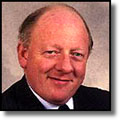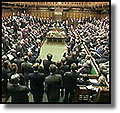Last Orders For PMQs
While some have mourned the passing of the traditional Prime Minister's Question Time, others have welcomed the changes.
It had always been the most raucous, clamorous, ill-tempered, funny and spectacular part of the Parliamentary week.
At its best, PMQs was a coruscating duel of ideas between two fiery orators. But at its worst it turned into a dreary trawl through predictable sound-bites.
Michael Foot, who was leader of the Labour party in Opposition from 1980 to 1983, was positive about having one 30-minute Question Time on a Wednesday afternoon.
"It's a pretty good idea. I'm glad he's making changes. The great thing about the British House of Commons is all the MPs have the chance to have a go at the ministers," he said.
"I'm sure that any changes that get made will enhance that. Direct attack on ministers is very important," said Mr Foot.

|
|
Speaker Betty Boothroyd keeps order
|
The Liberal Democrats, with a far greater presence in the Commons than before, were also positive.
"We have called for changes along these lines to make Prime Minister's Questions a more effective form of scrutiny instead of the shouting match which it had become," said Alan Beith, the party's deputy leader.
"But we will also want to make sure that the changes reflect the change on the Opposition benches now that there are 46 Lib Dem MPs and the Tories are so much reduced," he added.
Tories concerned
But the Conservative Party was far more wary. The former Prime Minister, John Major, said he was "particularly concerned" by the changes and urged Mr Blair to delay them until the new select committee on procedures had time to consider them.
"It is true that PMQs is a burden to any Prime Minister. But that is the point of it. It makes the Prime Minister directly accountable to Parliament," Mr Major said.
"The size of the Government's majority in the House at present the makes that accountability more important and not less," he continued. "For this reason I am particularly concerned at the proposal to reduce PMQs from two sessions each week to one."

|
|
Alastair Goodlad: "Consultation?"
|
His comments were echoed by the Tory Chief Whip and Shadow Leader of the House, Alastair Goodlad.
"This change reduces the accountability of the Prime Minister to the House of Commons on matters of immediate concern, and should have been the subject of consultation with the House," Mr Goodlad said.
The former Tory Cabinet Minister, William Hague, who's now a contender for the party leadership, said Mr Blair had used Question Time to the full while in opposition but now seemed to be shying away from scrutiny.
"It's plain that Mr Blair is going to try to bulldoze through his policies
without giving MPs the chance to put him to test, and bulldoze through important changes in Commons procedure to suit himself.
"High-handed and imperious"
Margaret Ewing, one of the Scottish National Party's six MPs, protested at the lack of
consultation - and called for a separate Question Time on European matters. She said the change had been announced in "high-handed and imperious" fashion; she learnt of it through the media - even though she was in the Commons until early afternoon.
She said the changes would lead to a loss of "immediacy", and she was also
concerned about the possible impact on Scottish Question Time, which normally
occupied a full session on one Wednesday a month.
"As far as the standard of exchanges is concerned, changing the format won't
make any difference. The only thing that will is an improvement in the behaviour of the Prime
Minister and the leader of the Opposition."
|



